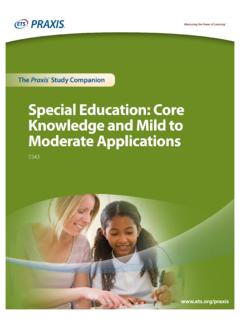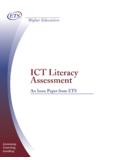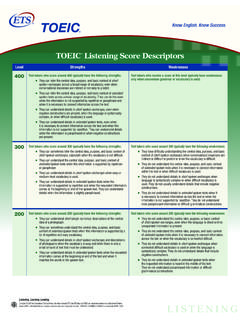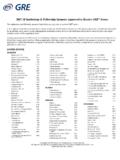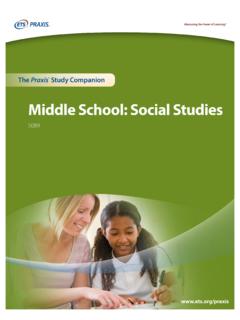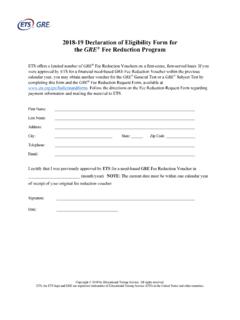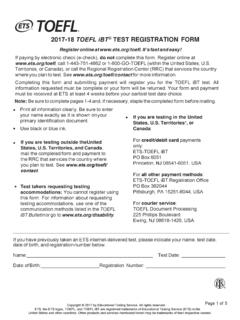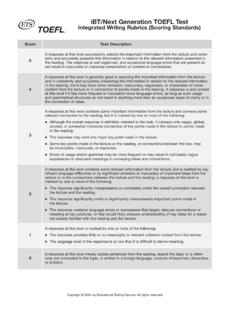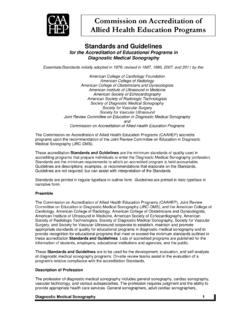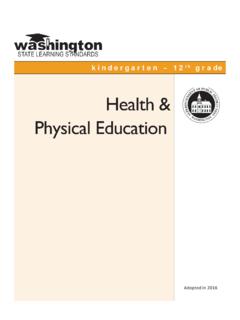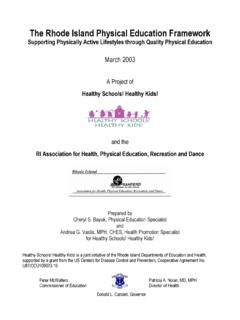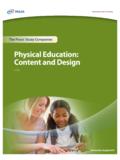Transcription of Health and Physical Education: Content Knowledge
1 The Praxis Study Companion Health and Physical education : Content Knowledge 5857. Welcome to the Praxis Study Companion Welcome to The Praxis Study Companion Prepare to Show What You Know You have been working to acquire the Knowledge and skills you need for your teaching career. Now you are ready to demonstrate your abilities by taking a Praxis test. Using The Praxis Study Companion is a smart way to prepare for the test so you can do your best on test day. This guide can help keep you on track and make the most efficient use of your study time. The Study Companion contains practical information and helpful tools, including: An overview of the Praxis tests Specific information on the Praxis test you are taking A template study plan Study topics Practice questions and explanations of correct answers Test-taking tips and strategies Frequently asked questions Links to more detailed information So where should you start? Begin by reviewing this guide in its entirety and note those sections that you need to revisit.
2 Then you can create your own personalized study plan and schedule based on your individual needs and how much time you have before test day. Keep in mind that study habits are individual. There are many different ways to successfully prepare for your test. Some people study better on their own, while others prefer a group dynamic. You may have more energy early in the day, but another test taker may concentrate better in the evening. So use this guide to develop the approach that works best for you. Your teaching career begins with preparation. Good luck! Know What to Expect Which tests should I take? Each state or agency that uses the Praxis tests sets its own requirements for which test or tests you must take for the teaching area you wish to pursue. Before you register for a test, confirm your state or agency's testing requirements at How are the Praxis tests given? Praxis tests are given on computer. Other formats are available for test takers approved for accommodations (see page 43).
3 The Praxis Study Companion 2. Welcome to the Praxis Study Companion What should I expect when taking the test on computer? When taking the test on computer, you can expect to be asked to provide proper identification at the test center. Once admitted, you will be given the opportunity to learn how the computer interface works (how to answer questions, how to skip questions, how to go back to questions you skipped, etc.) before the testing time begins. Watch the What to Expect on Test Day video to see what the experience is like. Where and when are the Praxis tests offered? You can select the test center that is most convenient for you. The Praxis tests are administered through an international network of test centers, which includes Prometric Testing Centers, some universities, and other locations throughout the world. Testing schedules may differ, so see the Praxis web site for more detailed test registration information at www.
4 The Praxis Study Companion 3. Table of Contents Table of Contents The Praxis Study Companion guides you through the steps to success 1. Learn About Your Learn about the specific test you will be taking 2. F. amiliarize Yourself with Test 11. Become comfortable with the types of questions you'll find on the Praxis tests 3. Practice with Sample Test 15. Answer practice questions and find explanations for correct answers 4. Determine Your Strategy for 26. Set clear goals and deadlines so your test preparation is focused and efficient 5. Develop Your Study 29. Develop a personalized study plan and schedule 6. Review Study 33. Review study topics with questions for discussion 7. Review Smart Tips for 41. Follow test-taking tips developed by experts 8. Check on Testing 43. See if you qualify for accommodations that may make it easier to take the Praxis test 9. Do Your Best on Test 44. Get ready for test day so you will be calm and confident 10.
5 Understand Your 46. Understand how tests are scored and how to interpret your test scores Appendix: Other Questions You May Have .. 48. The Praxis Study Companion 4. Step 1: Learn About Your Test 1. Learn About Your Test Learn about the specific test you will be taking Health and Physical education : Content Knowledge (5857). Test at a Glance Test Name Health and Physical education : Content Knowledge Test Code 5857. Time 130 minutes Number of Questions 130. Format Selected-response questions Test Delivery Computer delivered Approximate Approximate Content Categories Number of Percentage of Questions Examination Health education V I I. Health education as a Discipline/ 26 20%. Health Instruction IV II. Health education Content 32 25%. II. Physical education III. III. Content Knowledge and Student 22 17%. Growth and Development IV. Management, Motivation, and 29 22%. Communication/Collaboration, Reflection, and Technology V. Planning, Instruction, and Student Assessment 21 16%.
6 About This Test The Content Knowledge test in Health and Physical education is designed for prospective teachers of K-12. Health and Physical education . Examinees typically have completed a bachelor's degree program in Health and Physical education , Health and exercise science, Physical education and wellness, an equivalent degree, or have prepared themselves through some alternative certification program. Fifty-eight of the 130 test questions focus on studies of Health , and 72 focus on studies of and experiences in Physical education . Teaching standards from the Society of Health and Physical Educators (SHAPE America), formerly the American Alliance for Health , Physical education , Recreation and Dance (AAHPERD), were used to guide the Content of the test. NOTE: The recently adopted The Whole School, Whole Community, Whole Child (WSCC) model is an updated expansion of the traditional Coordinated School Health (CSH) approach. In the interest of fairness, and to allow time for educator preparation programs to integrate such changes into their curricula, Praxis material will continue to reference the coordinated school Health (CSH) approach until further notice.
7 This test may contain some questions that will not count toward your score. The Praxis Study Companion 5. Step 1: Learn About Your Test Test Specifications Test specifications in this chapter describe the Knowledge and skills measured by the test. Study topics to help you prepare to answer test questions can be found on page 33. Health education B. Health Instruction 1. Assessing learning needs for individuals and I. Health education as a Discipline/ Health diverse groups ( , identify developmentally Instruction appropriate instruction, cognitive abilities, multiple learning styles, and purposes of A. Health education as a Discipline pretesting). 1. Major Health behavior theories ( , stages of 2. Sequential instruction planning using change, behavioral change theory, performance-based objectives ( , identify transtheoretical model, and Health belief model). measurable objectives, performance indicators, 2. Health -related data using appropriate research elements of effective lesson and unit plans and methods ( , surveys, observations, and apply scope and sequence).)
8 Questionnaires and using data to draw 3. Aligning curriculum with national, state, and conclusions). district standards 3. Valid and reliable data sources and databases 4. Effective methods, strategies, and techniques to ( , YRBSS, NIH, CDC, SHAPE America, AMA, implement instruction ( , direct instruction, WHO, and peer-reviewed journals). cooperative learning, guided discovery, 4. Tools for conducting an assessment of school brainstorming, and role-playing). Health needs ( , comprehensive school Health 5. Reflective teaching process plan, surveys, needs assessment, and the Whole School, Whole Community, Whole Child (WSCC) 6. Assessing student learning ( , formative model, formerly the coordinated school (CSH) assessments, summative assessments, and approach) rubrics). 5. Curricular and extracurricular programs for 7. Classroom management strategies student Health needs 6. Appropriate educational materials from II. Health education Content professional organizations, agencies, and A.
9 Health Promotion and Prevention of Injury associations that meet the needs of diverse and Disease audiences 1. Disease etiology, prevention practices, treatment, 7. Resources involved in the Whole School, Whole and management Community, Whole Child (WSCC) model, formerly the coordinated school (CSH) approach 2. Communicable and noncommunicable diseases ( , infectious, congenital, hereditary, and 8. Effective communication with school staff, lifestyle). students, parents, and community ( , listening, mediating, and negotiating) 3. Research on practices that prevent chronic and communicable diseases 9. Professional, legal, and ethical practices regarding sensitive issues ( , privacy laws, 4. Goal setting and decision making for healthy confidentiality policy, permission forms, and lifestyles responsibility to report) 5. Concepts of Physical fitness and Health -related 10. Models for responsible decision making fitness ( , body composition, cardiorespiratory endurance, flexibility, muscular strength and 11.)
10 Concepts of character education endurance, and FITT). 12. Physical growth and development 6. Nutrition 13. Continuing education and professional 7. Stress management and coping skills development as a Health educator 8. Reducing and preventing Health risks 9. Anatomy, physiology, and body system interrelationships The Praxis Study Companion 6. Step 1: Learn About Your Test 10. Personal hygiene 5. Valid sources of Health information, products, 11. Behaviors that can compromise Health or safety and services 12. Relationship between lifestyle choices and Health 6. Health -related careers outcomes 7. Community Health agencies available for 13. Effects of substance use and abuse ( , assistance and referral ( , American Red Cross physiological, psychological, legal, and societal) and other national agencies, Planned Parenthood, Health departments, social service 14. Care for injuries and sudden illnesses ( , first agencies, school-based Health clinics).
